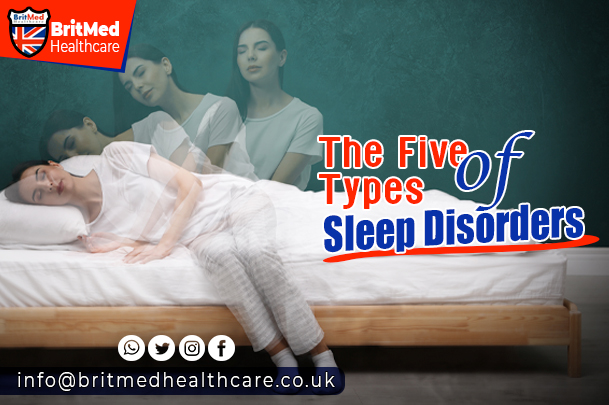The Five Types of Sleep Disorders: A Comprehensive Overview
Sleep is a vital aspect of human health, and a good night’s rest is essential for physical and mental well-being. However, for many individuals, a restful night’s sleep is a luxury that is often elusive. Sleep disorders are a common affliction that can have a significant impact on daily life, affecting not only one’s quality of sleep but also overall health and productivity. In this article, we will explore the five main types of sleep disorders, their causes, symptoms, and treatment options.
1. Insomnia
Insomnia is the most common sleep disorder, characterized by difficulty falling asleep or staying asleep. It can be acute or chronic, lasting for a few days or several weeks or months. Causes of insomnia include stress, anxiety, depression, physical discomfort, and certain medications. Symptoms include difficulty falling asleep, frequent awakenings during the night, and difficulty returning to sleep after waking up.
Treatment options for insomnia include relaxation techniques such as progressive muscle relaxation and deep breathing exercises, cognitive-behavioral therapy (CBT), and medications such as benzodiazepines and non-benzodiazepines.
2. Sleep Apnea
Sleep apnea is a serious sleep disorder characterized by pauses in breathing during sleep. There are three types of sleep apnea: obstructive sleep apnea (OSA), central sleep apnea (CSA), and mixed sleep apnea. OSA is the most common type, caused by a blockage in the airway due to excess tissue or a narrow airway. CSA is caused by a lack of effort to breathe during sleep.
Symptoms of sleep apnea include loud snoring, frequent awakenings during the night, daytime fatigue, and headaches. Treatment options for sleep apnea include weight loss, CPAP (continuous positive airway pressure) therapy, oral appliances, and surgery.
3. Narcolepsy
Narcolepsy is a neurological disorder characterized by excessive daytime sleepiness and sudden attacks of sleep. It is caused by a deficiency in the production of hypocretin, a neurotransmitter that regulates sleep-wake cycles. Symptoms of narcolepsy include excessive daytime sleepiness, cataplexy (a sudden loss of muscle tone), hypnagogic hallucinations (dream-like states), and sleep paralysis.
Treatment options for narcolepsy include medications such as modafinil and stimulants, behavioral therapy such as scheduled naps and relaxation techniques, and lifestyle changes such as regular exercise and avoiding caffeine.
4. Restless Legs Syndrome (RLS)
Restless Legs Syndrome (RLS) is a neurological disorder characterized by an uncontrollable urge to move one’s legs during the night. It is often accompanied by uncomfortable sensations such as tingling, burning, or itching in the legs. Symptoms of RLS include difficulty falling asleep due to leg movements during the night.
Treatment options for RLS include medications such as dopamine agonists and anticonvulsants, lifestyle changes such as regular exercise and avoiding caffeine, and alternative therapies such as acupuncture and massage.
5. Periodic Limb Movement Disorder (PLMD)
Periodic Limb Movement Disorder (PLMD) is a neurological disorder characterized by involuntary movements of the legs during sleep. It is often accompanied by symptoms of restless legs syndrome (RLS). Symptoms of PLMD include frequent awakenings during the night due to leg movements.
Treatment options for PLMD include medications such as dopamine agonists and anticonvulsants, lifestyle changes such as regular exercise and avoiding caffeine, and alternative therapies such as acupuncture and massage.
In conclusion, sleep disorders are a common affliction that can have a significant impact on daily life. By understanding the different types of sleep disorders – insomnia, sleep apnea, narcolepsy, restless legs syndrome (RLS), and periodic limb movement disorder (PLMD) – individuals can take steps to manage their symptoms and improve their overall quality of life.
References:
https://www.sleepfoundation.org/physical-health
https://www.psychiatry.org/patients-families/sleep-disorders/what-are-sleep-disorders
https://my.clevelandclinic.org/health/diseases/11429-sleep-disorders
Websites:
Britmed Healthcare: https://britmedhealthcare.co.uk/
Nightingale Hospital: https://www.nightingalehospital.co.uk/
You can also book on Top Doctors UK Contact us on WhatsApp 08009708017
Top Doctors: https://www.topdoctors.co.uk/doctor/ahmed-el-missiry




